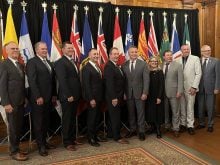Municipal leaders are up in arms over unexpected provincial cuts to a crucial program that helps pay for road and bridge repairs.
A record number of councils backed a resolution condemning the end of the Municipal Road and Bridge Program at the Association of Manitoba Municipalities annual convention last week.
The often-spirited discussion could have continued for hours, had all 102 out of 137 councils supporting the call taken the floor.
They say they’re now on the hook for the full cost of repairs after the province announced the end of the program suddenly this summer, after spending only $2.5 million in 2018, compared to the $14 million spent in 2018.
Read Also

VIDEO: Manitoba’s Past Lane – Jan. 31
Manitoba, 1946 — Post-war rations for both people and cows: The latest look back at over a century of the Manitoba Co-operator
Why it matters: Roads and bridges are essential infrastructure and this was a simple and easy to access program to pay for them.
City of Selkirk Mayor Larry Johannson told the annual convention of the Association of Manitoba Municipalities his community — and others across the province — only learned they’d lose the funding this summer, after already signing construction contracts.
“The road and bridge program has been used to add to essential infrastructure or do repairs on essential infrastructure,” Johannson said.
The program has been in place for several years and was valued for its simplicity and ease of access.
“In our case we’d been getting $400,000 a year which we matched to put up $800,000,” said Johannson. “We didn’t get quite $80,000 this year. It paid for one street.”
The RM of Morris received no money at all.
“We were going to repair roads in the community of Sperling,” said the municipality’s reeve, Ralph Groening, who last week also became AMM’s president.
“So we filled the potholes. That’s how we were impacted by the elimination of the program.”

Groening said municipalities aren’t clear why the program is ending and don’t like the plan they’ve heard to tie it into the federal Investing in Canada infrastructure program.
“We weren’t pleased with that response,” Groening said. “Because it is a more complex program.
“Our argument to (Municipal Relations) Minister Wharton is that the (Municipal Roads and Bridges) program was understood by all the municipalities.”
It was devoid of ‘red tape’ through a single window application, Groening said.
“It was simple. You made an application and if successful, you had 50-cent dollars in a collaborative way to do the repairs to whatever project you proposed.”
Reallocating the funds to Investing in Canada “… is simply not going to add to the efficiency,” he said.
The specifics of the resolution ask the province not to make the change and reinstate former funding levels to the existing one.
This matters because roads are fundamental infrastructure, and we can’t grow a provincial economy when parts of the province are hindered from shipping goods on roads in rough shape, Groening said.
Municipalities are repeatedly raising concerns about road conditions hindering heavy farm truck traffic, he said.
“There’s a very direct connection to the loss of the program and the need for farmers to get their product to market,” he said.
AMM’s ongoing ask is “for a grid system of quality north-south roads” right across Manitoba able to withstand maximum allowable weights, said Groening.
“And we don’t have that now.”
Wharton said in a prepared statement to media that the province has heard municipalities’ concerns, and is in final stages of designing an improved infrastructure program for provincial investment in roads and bridges, but divulged no details.
“We acknowledge the concerns and we understand the needs for reduction of red tape, predictable, stable and long-term funding,” he said.
Johansson said if another program is unveiled offering the same value — and municipal leaders can use gas tax revenues to contribute their share of it — he’ll be satisfied, but he still wants to see an interim program in place until it’s ready.
Road work can’t simply be put off and they can’t be expected to raise funds for it off local ratepayers, he said.
“If we are going to go and fund the complete $800,000 in the City of Selkirk, for example, that would add on an extra $80 per year to the tax bill over every citizen and taxpayer in the city,” he said.
“That would hurt in the pocketbook.”
















